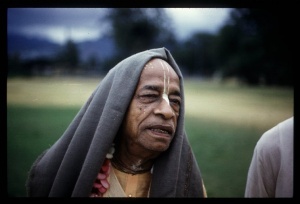SB 3.19.33

A.C. Bhaktivedanta Swami Prabhupada
TEXT 33
- sūta uvāca
- iti kauṣāravākhyātām
- āśrutya bhagavat-kathām
- kṣattānandaṁ paraṁ lebhe
- mahā-bhāgavato dvija
SYNONYMS
sūtaḥ — Sūta Gosvāmī; uvāca — said; iti — thus; kauṣārava — from Maitreya (son of Kuṣāru); ākhyātām — told; āśrutya — having heard; bhagavat-kathām — the narration about the Lord; kṣattā — Vidura; ānandam — bliss; param — transcendental; lebhe — achieved; mahā-bhāgavataḥ — the great devotee; dvija — O brāhmaṇa (Śaunaka).
TRANSLATION
Śrī Sūta Gosvāmī continued: My dear brāhmaṇa, Kṣattā [Vidura] the great devotee of the Lord achieved transcendental bliss by hearing the narration of the pastimes of the Supreme Personality of Godhead from the authoritative source of the sage Kauṣārava [Maitreya], and he was very pleased.
PURPORT
If anyone wants to derive transcendental pleasure by hearing the pastimes of the Lord, he must hear from the authoritative source, as explained here. Maitreya heard the narration from his bona fide spiritual master, and Vidura also heard from Maitreya. One becomes an authority simply by presenting whatever he has heard from his spiritual master, and one who does not accept a bona fide spiritual master cannot be an authority. This is clearly explained here. If one wants to have transcendental pleasure, he must find a person with authority. It is also stated in the Bhāgavatam that simply by hearing from an authoritative source, with the ear and the heart, one can relish the pastimes of the Lord, otherwise it is not possible. Sanātana Gosvāmī, therefore, has especially warned that one should not hear anything about the personality of the Lord from the lips of a nondevotee. Nondevotees are considered to be like serpents; as milk is poisoned by a serpent's touch, so, although the narration of the pastimes of the Lord is as pure as milk, when administered by serpentlike nondevotees it becomes poisonous. Not only does it have no effect in transcendental pleasure, but it is dangerous also. Lord Caitanya Mahāprabhu has warned that no description of the pastimes of the Lord should be heard from the Māyāvāda, or impersonalist, school. He has clearly said, māyāvādi-bhāṣya śunile haya sarva nāśa: if anyone hears the Māyāvādīs' interpretation of the pastimes of the Lord, or their interpretation of Bhagavad-gītā, Śrīmad-Bhāgavatam or any other Vedic literature, then he is doomed. Once one is associated with impersonalists, he can never understand the personal feature of the Lord and His transcendental pastimes.
Sūta Gosvāmī was speaking to the sages headed by Śaunaka, and therefore he addressed them in this verse as dvija, twice-born. The sages assembled in Naimiṣāraṇya hearing Śrīmad-Bhāgavatam from Sūta Gosvāmī were all brāhmaṇas, but to acquire the qualifications of a brāhmaṇa is not everything. Merely to be twice-born is not perfection. Perfection is attained when one hears the pastimes and activities of the Lord from a bona fide source.